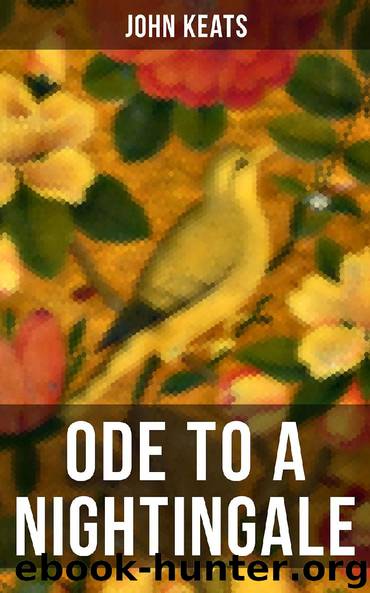Ode to a Nightingale by John Keats

Author:John Keats [Keats, John]
Language: eng
Format: epub
ISBN: 9788027230037
Publisher: Musaicum Press
Published: 2017-10-12T00:00:00+00:00
Chapter X
Table of Contents
SEPTEMBER-DECEMBER 1818: BLACKWOOD AND THE QUARTERLY
On the first of September, within a fortnight of Keats’ return from the North, appeared the threatened attack on him in Blackwood’s Edinburgh Magazine. Much as has been said and written on the history and effect of the ‘Cockney School’ articles, my task requires that the story should be retold, as accurately and fairly as may be, in the light of our present knowledge.
The Whig party in politics and letters had held full ascendency for half a generation in the periodical literature of Scotland by means of the Edinburgh Review, published by Archibald Constable and edited at this time by Jeffrey. The Tory rival, the Quarterly, was owned and published also by a Scotsman, but a Scotsman migrated to London, John Murray. Early in 1817 William Blackwood, an able Tory bookseller in Edinburgh, projected a new monthly review which should be a thorn in the side of his astute and ambitious trade rival, Constable, and at the same time should hold up the party flag against the blue and yellow Whig colours in the North, and show a livelier and lustier fighting temper than the Quarterly. The first number appeared in March under the title of The Edinburgh Monthly Magazine. The first editors were two insignificant men who proved neither competent nor loyal, and flat failure threatening the enterprise, Blackwood after six months got rid of the editors and determined to make a fresh start. He added his own name to the title of the magazine and called to his aid two brilliant young men who had been occasional contributors, John Wilson and John Gibson Lockhart, both sound Oxford scholars and Lockhart moreover a well-read modern linguist, both penmen of extraordinary facility and power of work, both at this period of their lives given, in a spirit partly of furious partisanship partly of reckless frolic, to a degree of licence in controversy and satire inconceivable to-day. Wilson, by birth the son of a rich Glasgow manufacturer but now reduced in fortune, was in person a magnificent, florid, blue-eyed athlete of thirty, and in literature the bully and Berserker of the pair. Lockhart, the scion of an ancient Lanarkshire house, a dark, proud, handsome and graceful youth of twenty-three, pensive and sardonically reserved, had a deadly gift of satire and caricature and a lust for exercising it which was for a time uncontrollable like a disease. Wilson had lived on Windermere in the intimacy of Wordsworth and his circle, and already made a certain mark in literature with his poem The Isle of Palms. Lockhart had made a few firm friends at Oxford and after his degree had frequented the Goethe circle at Weimar, but was otherwise without social or literary experience. Blackwood was the eager employer and unflinching backer of both. The trio were determined to push the magazine into notoriety by fair means or foul. Its management was informally divided between them, so that no one person could be held responsible.
Download
This site does not store any files on its server. We only index and link to content provided by other sites. Please contact the content providers to delete copyright contents if any and email us, we'll remove relevant links or contents immediately.
| Ancient, Classical & Medieval | Anthologies |
| British & Irish | Japanese & Haiku |
| Love Poems | Regional & Cultural |
| Themes & Styles | United States |
| Women Authors |
The Universe of Us by Lang Leav(15053)
The Sun and Her Flowers by Rupi Kaur(14497)
Adultolescence by Gabbie Hanna(8904)
Whiskey Words & a Shovel II by r.h. Sin(7998)
Love Her Wild by Atticus(7739)
Smoke & Mirrors by Michael Faudet(6170)
Wiseguy by Nicholas Pileggi(5754)
The Princess Saves Herself in This One by Amanda Lovelace(4961)
Love & Misadventure by Lang Leav(4830)
Memories by Lang Leav(4787)
Milk and Honey by Rupi Kaur(4735)
Bluets by Maggie Nelson(4535)
Too Much and Not the Mood by Durga Chew-Bose(4321)
Pillow Thoughts by Courtney Peppernell(4264)
Good morning to Goodnight by Eleni Kaur(4217)
The Poetry of Pablo Neruda by Pablo Neruda(4082)
Algedonic by r.h. Sin(4050)
HER II by Pierre Alex Jeanty(3596)
Stuff I've Been Feeling Lately by Alicia Cook(3441)
